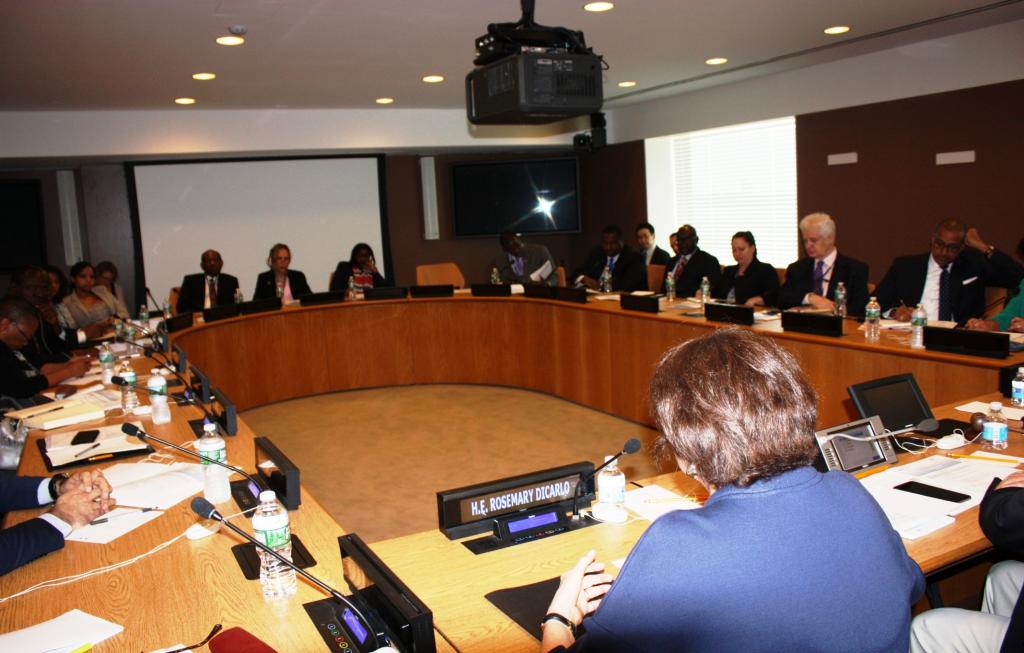High-Level Training for Permanent Representatives, Deputy Permanent Representatives and Chargés D’Affaires
 12 May 2016, New York, USA – The New York Office of the United Nations Institute for Training and Research (UNITAR), in partnership with the Permanent Mission of Italy to the United Nations, organized a “High-Level Training for Permanent Representatives, Deputy Permanent Representatives and Chargés D’Affaires” that took place on 12 May 2016 at UN Headquarters. The seminar was attended by approximately 30 ambassadors, among them permanent representatives, deputy permanent representatives and chargés d’affaires from permanent missions in New York. The Permanent Representatives from the Marshall Islands, Jamaica, Seychelles, Grenada, Bosnia-Herzegovina, Guyana, and Afghanistan were in attendance.
12 May 2016, New York, USA – The New York Office of the United Nations Institute for Training and Research (UNITAR), in partnership with the Permanent Mission of Italy to the United Nations, organized a “High-Level Training for Permanent Representatives, Deputy Permanent Representatives and Chargés D’Affaires” that took place on 12 May 2016 at UN Headquarters. The seminar was attended by approximately 30 ambassadors, among them permanent representatives, deputy permanent representatives and chargés d’affaires from permanent missions in New York. The Permanent Representatives from the Marshall Islands, Jamaica, Seychelles, Grenada, Bosnia-Herzegovina, Guyana, and Afghanistan were in attendance.
Mr. Marco A. Suazo, representing UNITAR’s New York Office, opened the seminar with a short presentation of UNITAR’s work. He emphasized that UNITAR is programme-driven and greatly appreciates the cooperation and support of partner member states and other organizations. He stated that this high-level training was designed to share the insights of experienced former diplomats, experts, and high UN officials on the intricacies of working within the United Nations system.
H.E. Mr. Sebastian Cardi, Permanent Representative of Italy to the United Nations, told the participants that Italy has partnered with UNITAR to support a catalog of five training courses for developing countries. These courses are devoted to a number of issues, ranging from the effective use of social media to the drafting of UN resolutions. He expressed his appreciation for the Italian mission’s excellent partnership with UNITAR.
Keynote speaker, Ms. Rosemary DiCarlo, former US Deputy Permanent Representative to the UN and current President of the National Committee on American Foreign Policy, shared her long-term UN experience and reflected on some crucial issues affecting the UN’s future relevance. She spoke on questions of sovereignty, of the responsibility to protect, as well as of a range of peace and security issues on the Security Council agenda. Ms. DiCarlo emphasized that in the UN, “every single country matters” and that a thorough knowledge of the Charter and of the rules of procedure is crucial for the success of a mission’s work at the UN, as is their ability to forge a compromise.
SESSION I: Overview of the Credentials
The first session was devoted to credential procedures for different organs of the UN. Mr. Larry Johnson, Former Assistant-Secretary-General for Legal Affairs of the UN, and Ms. Norma Chan, Former Acting Director of the Security Council Affairs Division of the UN, presented the credential process for the Secretary-General, General Assembly, Security Council, Economic and Social Council (ECOSOC) as well as for United Nations Conferences. The panelists discussed the reasons behind the need for overlapping credentials to UN organs during the Q&A session.
 SESSION II: Organization of work of the General Assembly
SESSION II: Organization of work of the General Assembly
Mr. Johnson and Ms. Maria Maldonado, the Former Director of the UN General Assembly Affairs Branch, explained in detail during the second session the organization of General Assembly. They presented its structure, the role of the General Committee and of the main committees as well as procedures for the inscription and allocation of items. In addition, they described General Assembly decision-making, different voting rules for the General Assembly and the Security Council, as well as processes of presenting, revising and amending draft resolutions. Rules on the conduct of business were explained in some detail, including those pertaining to no action motions. During the Q&A session, participants discussed ways in which the rules of procedure could be employed efficiently to further member state goals, including the use of points of order.
SESSION III: Work of the Security Council
In the third session, Ms. Chan described the work of the Security Council. She focused her presentation on the preparation process for non-permanent membership and presidency as well as on practical tips for conducting business as a non-permanent member. Special attention was devoted on ways to submit a letter for circulation as a Security Council document, procedures for securing participation in meetings and requesting a Security Council meeting. During the Q&A session, different aspects of decision-making on procedural and substantive matters were discussed, with special attention devoted to explaining the procedure for bringing situations presenting a threat to international peace and security to Security Council attention.
 SESSION IV: UN Sanctions
SESSION IV: UN Sanctions
The last and fourth session was on UN sanctions. Ms. Loraine Rickard-Martin, former Secretary of the UN Sanctions Committees, and Mr. Enrico Carisch, former Coordinator of the UN Sanctions Panel of Experts, presented an overview of the evolution of sanctions, from the comprehensive approach used until the 1990s to the preventive, targeted approach in use today. They addressed crucial challenges in implementing sanctions, including the necessity of thorough due process, enlisting the cooperation of a wide array of international actors, and putting in place effective monitoring mechanisms. In the Q&A session, questions addressed sanction efficacy, their impact on populations at large, as well as ways in which sanctioned countries can be helped in bearing the burden of sanctions.
Photos; Participants and panelists of the training session.

